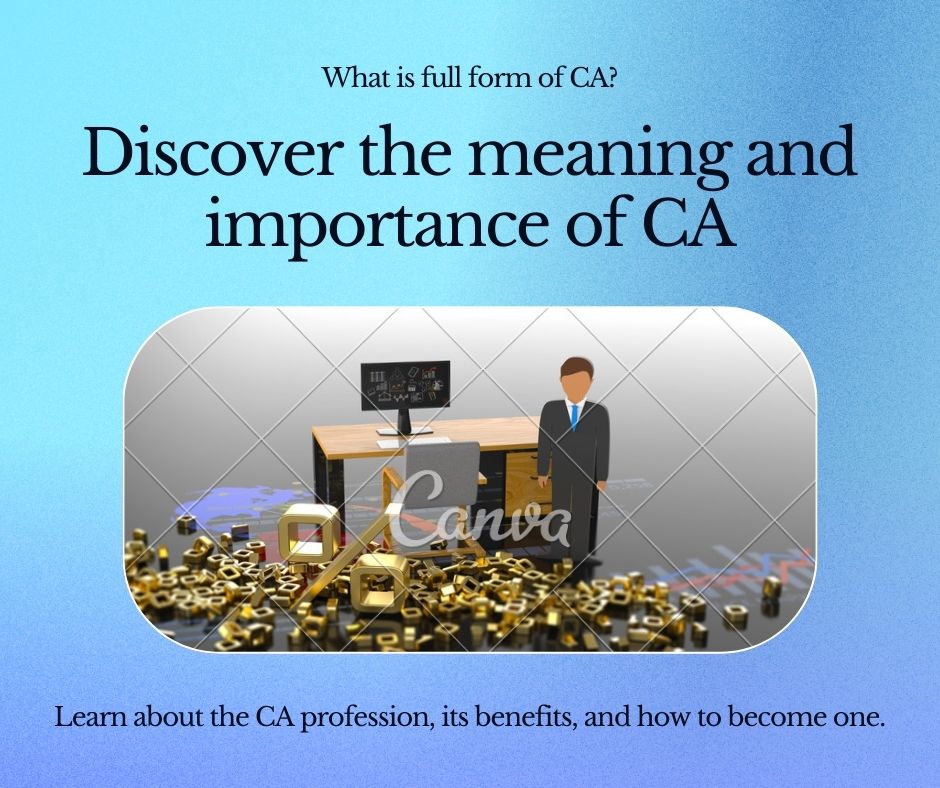Full Form of CA: Chartered Accountant
In the world of finance and accounting, the designation “CA” holds significant weight and prestige. But what exactly does it mean to be a Chartered Accountant? Let’s delve into the intricacies of this profession, uncovering its real meaning and impact.

Key Takeaways From Personal Experience:
- CA means Chartered Accountant and is one of the most prestigious and rigorous courses in India.
- It is conducted by ICAI ( Instituted of Chartered Accountants of India) all over the India which is one of the most prestigious institute of India.
- There is No College or School for CA. Candidates can either do Self-study with the help of Study Material provided by ICAI or can enroll in private coaching institutes either teaching via Online/Offline Mode.
- It consists of 3 Study Levels: Foundation, Intermediate, and Final. It can be started directly after the 12th Standard. If one has Completed Graduation in Commerce, then he/she gets a direct entry in Intermediate Level based on Bachelor’s Degree in Commerce (B.com)
- It consists of 3 years of Practical Training namely Articleship which is undergone under the guidance of a Practicing Chartered Accountant.
- It takes a minimum of 4.5 years to 5 years from the 12th standard to clear all the study and training levels of the Chartered Accountancy Course.
Table of Contents
Introduction to Chartered Accountancy (CA)
Full form of CA: Who is a Chartered Accountant?
A Chartered Accountant, commonly known as a CA, is a professional who has obtained the necessary qualifications and certifications to provide a range of accounting and financial services to individuals, businesses, and organizations. Chartered Accountants (CAs) hold significant financial accountability and are essential in maintaining the honesty and openness of financial dealings.
Importance and Role of CAs
Chartered Accountants are not just number crunchers; they are strategic advisors, auditors, and financial consultants. Their expertise is essential for maintaining financial health, ensuring compliance with regulations, and facilitating informed decision-making within businesses and across industries.
History and Evolution of Chartered Accountancy
Origins of Chartered Accountancy
The roots of chartered accountancy can be traced back to medieval times when professional accountants were granted charters by the crown to perform audits and certify financial statements. Over the centuries, the profession has evolved significantly, adapting to changing economic landscapes and emerging regulatory frameworks.
Evolution Over Time
From its humble beginnings as a profession focused primarily on bookkeeping and record-keeping, chartered accountancy has evolved into a multifaceted discipline encompassing financial reporting, taxation, forensic accounting, and strategic financial management.

Qualifications and Training Required to Become a CA
Educational Requirements
Becoming a Chartered Accountant requires a rigorous educational journey. Prospective CAs typically enroll Chartered Accountancy Course of ICAI after their 12th exams.fu
Full Form of CA means going through 3 Levels of Exams (Foundation, Intermediate and Final)
Aspirants Undergo three levels of exams, namely:
1. Foundation or CPT (Common Proficiency Test)
2. Intermediate Or IPCC (Integrated Professional Competence Course)
3. Final
Professional Training and Certifications
In addition to academic qualifications, aspiring CAs must complete a 3 year period of practical training under the guidance of experienced professionals and pass rigorous examinations administered by recognized accounting bodies such as the ICAI.
Time taken to complete CA Course
Typically it takes approximately 4 to 5 years to complete all levels of CA depending on in which attempt, one clears their 3 levels, i.e., Foundation, Inter, and Final. If they are cleared in the first attempt only then it takes 4.5 years from 12th standard completion to get a CA degree in your hands!
Functions and Responsibilities of a Chartered Accountant
Financial Auditing
One of the primary functions of a Chartered Accountant is to conduct audits of financial statements to ensure accuracy, reliability, and compliance with accounting standards and regulations. Auditing plays a crucial role in maintaining the credibility of financial information and fostering investor confidence.
Taxation Services
CAs are well-versed in tax laws and regulations, providing tax planning, compliance, and advisory services to individuals and businesses. They help clients navigate complex tax regimes, optimize tax liabilities, and ensure adherence to tax filing deadlines.
Financial Management and Advisory
Chartered Accountants serve as trusted advisors to businesses, offering insights into financial performance, budgeting, forecasting, and strategic planning. They play a crucial role in helping organizations achieve their financial objectives and navigate economic challenges.
Different Sectors Where CAs Work
Public Accounting Firms
Many Chartered Accountants work in public accounting firms, offering a wide range of services to clients across various industries. They may specialize in audit, tax, advisory, or consultancy services, catering to the diverse needs of businesses and individuals.
Corporate Sector
In the corporate sector, CAs hold key positions in finance departments, serving as financial controllers, chief financial officers (CFOs), or financial analysts. They are instrumental in financial reporting, budgeting, risk management, and strategic decision-making within organizations.
Government Agencies
Chartered Accountants also find employment opportunities in government agencies, regulatory bodies, and public sector organizations. They contribute their expertise to areas such as public finance management, taxation policy, and regulatory compliance.
Chartered Accountants vs. Other Accounting Professionals
Contrasts with Other Accounting Designations
While there are various accounting designations and certifications available, the Chartered Accountancy qualification is often regarded as the gold standard in the accounting profession. CAs undergo rigorous training and examinations, equipping them with a comprehensive understanding of accounting principles, taxation laws, and financial regulations.
Unique Skills and Expertise of CAs
Chartered Accountants possess a unique blend of technical knowledge, analytical skills, and ethical values that set them apart from other accounting professionals. Their ability to interpret complex financial data, identify risks, and provide strategic insights makes them invaluable assets in the business world.
Importance of Chartered Accountants in Business and Finance
Key Roles in Ensuring Financial Integrity
The role of Chartered Accountants in maintaining financial integrity cannot be overstated. They play a crucial role in detecting and preventing financial fraud, ensuring compliance with accounting standards, and upholding the principles of transparency and accountability.
Contribution to Regulatory Compliance
In an increasingly complex regulatory environment, Chartered Accountants help businesses navigate regulatory requirements, mitigate compliance risks, and uphold ethical standards. Their expertise in financial reporting and auditing ensures that organizations operate within the bounds of legal and regulatory frameworks.
Challenges Faced by Chartered Accountants
Evolving Regulatory Landscape
Chartered Accountants must stay abreast of evolving regulatory frameworks, accounting standards, and tax laws to effectively serve their clients and employers. Keeping pace with regulatory changes and adapting to new reporting requirements pose ongoing challenges for CAs.
Technological Advancements
The rapid pace of technological advancements presents both opportunities and challenges for Chartered Accountants. While automation and digital tools enhance efficiency and accuracy in financial reporting, they also require CAs to acquire new skills and competencies to remain competitive in the digital age.
Future Outlook for Chartered Accountancy
Emerging Trends and Opportunities
Despite the challenges, the future outlook for chartered accountancy remains promising. Technological advancements such as artificial intelligence, data analytics, and blockchain are reshaping the accounting profession, creating new opportunities for CAs to add value through innovation and technology-driven solutions.
Continued Relevance in a Changing World
In a rapidly changing business landscape, the role of Chartered Accountants will continue to be indispensable. As businesses navigate economic uncertainties, regulatory complexities, and technological disruptions, CAs will play a vital role in providing financial stewardship, strategic guidance, and ethical leadership.
Conclusion
In conclusion, Chartered Accountancy represents more than just a professional designation; it embodies a commitment to excellence, integrity, and continuous learning. CAs serve as guardians of financial integrity, trusted advisors to businesses, and catalysts for sustainable growth. As the guardians of financial integrity and trusted advisors to businesses, Chartered Accountants play a pivotal role in driving economic prosperity and fostering trust and confidence in the financial markets
Unique FAQs
What distinguishes chartered accountants from other members of the accounting profession?
Chartered Accountants undergo rigorous training, examinations, and practical experience, equipping them with a comprehensive understanding of accounting principles, taxation laws, and financial regulations. Their unique blend of technical knowledge, analytical skills, and ethical values sets them apart in the accounting profession.
What kind of schooling is needed to become a chartered accountant?
Prospective Chartered Accountants typically pursue undergraduate degrees in accounting, finance, or related fields, followed by specialized training through accredited accounting bodies or institutions. They must also pass rigorous examinations and fulfill practical experience requirements.
How do Chartered Accountants contribute to regulatory compliance?
Chartered Accountants help businesses navigate complex regulatory frameworks, mitigate compliance risks, and uphold ethical standards. They ensure compliance with accounting standards, tax laws, and regulatory requirements, fostering transparency and accountability in financial reporting.
What challenges do Chartered Accountants face in the digital age?
Chartered Accountants face challenges in adapting to technological advancements such as automation, artificial intelligence, and blockchain. While these technologies enhance efficiency and accuracy in financial reporting, they require CAs to acquire new skills and competencies to remain competitive.
What is the future outlook for Chartered Accountancy?
Despite challenges, the future outlook for Chartered Accountancy remains promising. Technological advancements and evolving business landscapes create new opportunities for CAs to add value through innovation, strategic advisory, and technology-driven solutions.
Do read our previous article on:
Tax Abatement
Multi Step Financial Statements


Pingback: IND AS 115